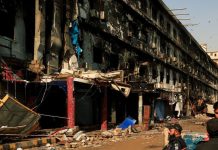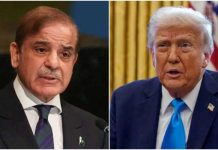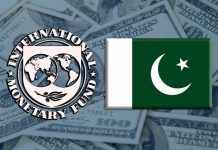| Initiates to deploy 4 new battle groups to eastern flank | Advises Russia against using chemical weapons | Russian FM says peacekeepers in Ukraine could lead to clash with NATO | Warns NATO to stay away from Ukraine issue | Kyiv, Moscow agree deal to set up nine humanitarian corridors
DM Monitoring
BRUSSELS: NATO is ready to bolster its presence in Eastern Europe to counter Russian aggression amid the ongoing invasion of Ukraine, Secretary-General Jens Stoltenberg said Wednesday ahead of a crucial summit of leaders of member countries.
“I expect leaders will agree to strengthen NATO’s posture in all domains with major increases of forces in the eastern part of the alliance, on land, in the air and at sea. The first step is the deployment of four new NATO battle groups in Bulgaria, Hungary, Romania, and Slovakia,” Stoltenberg told journalists ahead of the urgent summit taking place on Thursday in the Belgian capital Brussels.
He said that with the new battle groups and existing forces in the Baltic countries and Poland, NATO would have eight multinational groups along the alliance’s eastern flank. Stoltenberg said that the Ukraine crisis has shown that NATO must reset its deterrence and defense posture for the longer term.
NATO leaders are also set to agree on extra support for Ukraine to deal with chemical and nuclear threats, Stoltenberg said.
“Tomorrow, I expect allies will agree to provide additional support, including cybersecurity assistance as well as equipment to help Ukraine protect against chemical, biological, radiological and nuclear threats,” he said.
“Any use of chemical weapons would totally change the nature of the conflict, it would be a blatant violation of international law and would have far-reaching consequences,” the secretary-general warned.
Belarus has been “complicit” in Russia’s invasion of Ukraine even before it was launched, allowing its territory to be used for massing troops, and it continues to enable the invasion by allowing its military airfields to be used by Russian forces to launch attacks on Ukrainian cities and civilians, Stoltenberg also said.
Western allies are concerned that China could provide material support to Russia for its war in Ukraine, he noted.
“China has provided Russia with political support, including by spreading blatant lies and disinformation, and allies are concerned that China could provide material support for the Russian invasion,” Stoltenberg said.
He added that NATO leaders would “call on China to live up to its responsibilities as a member of the U.N. Security Council, refrain from supporting Russia’s war efforts, and join the rest of the world in calling for an immediate peaceful end to this war.”
Meanwhile, Russian Foreign Minister Sergei Lavrov on Wednesday said sending peacekeepers to Ukraine could lead to a direct confrontation between Russia and the NATO military alliance.
Poland said last week that it would formally submit a proposal for a peacekeeping mission in Ukraine at the next NATO summit.
“I hope they understand what they are talking about,” Lavrov told staff and students at the Moscow State Institute of International Relations. “This will be the direct clash between the Russian and NATO armed forces that everyone has not only tried to avoid but said should not take place in principle.”
Moscow has accused Kyiv of stalling peace talks by making proposals unacceptable for Russia. Ukraine has said it is willing to negotiate but will not surrender or accept Russian ultimatums.
Lavrov said Ukrainian authorities were backing away from their own proposals at the talks, making it difficult to achieve a breakthrough.
“The talks have started, they are difficult because the Ukrainian side … constantly changes its mind and backs away from its own proposals,” Lavrov said.
Ukrainian President Volodymyr Zelenskyy said earlier on Wednesday that the talks with Russia were tough and at times confrontational.
Russia sent tens of thousands of troops into Ukraine in what it called a special operation to degrade its southern neighbor’s military capabilities and root out people it called dangerous nationalists.
Ukrainian forces have mounted stiff resistance and the West has imposed sweeping sanctions on Russia in an effort to force it to withdraw its forces.



